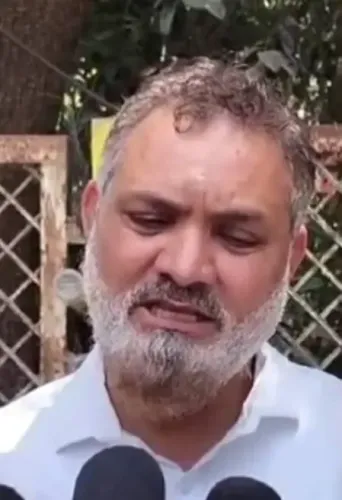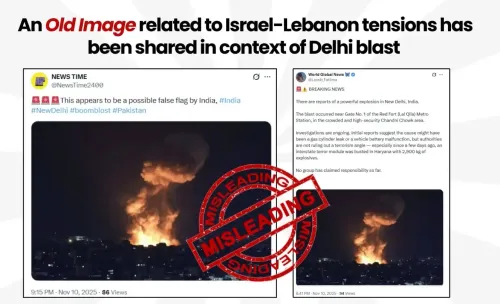Is Pakistan Allegedly Supporting ISKP-ISPP to Intimidate Baloch Nationalists?

Synopsis
Key Takeaways
- The Quetta bombing highlights the ongoing violence in Balochistan.
- ISKP-ISPP's rise is linked to state policies favoring extremist groups.
- The Pakistan Army prioritizes control over Baloch resources and dissent.
- Baloch nationalists face significant threats from both the military and extremist groups.
- The international community must recognize the complexities of Pakistan's counterterrorism narrative.
New Delhi, Sep 18 (NationPress) On September 2, 2025, Quetta once again witnessed a horrific act of violence as a suicide bomber targeted a rally of the Balochistan National Party-Mengal (BNP-M), resulting in the deaths of at least 14 individuals and injuring over 30 others. The Islamic State Pakistan Province (ISPP), a faction of the notorious Islamic State Khorasan Province (ISKP), swiftly claimed responsibility for the attack.
For many who observe the situation from afar, this appeared to be yet another tragic incident of terror in Pakistan's most unstable province. However, for those who have been tracking the patterns of violence in Balochistan for years, this event signifies something considerably more alarming: the culmination of a long-standing policy by the Pakistani state that has intentionally permitted transnational jihadist groups to flourish while simultaneously targeting nationalist voices advocating for the rights of the Baloch population.
This attack was not an arbitrary act of terror; it stemmed from a calculated strategy that has repeatedly favored militant Islamists over secular, nationalist, and democratic movements. For decades, the Pakistan Army and its intelligence agencies have perceived Baloch nationalism as a more significant threat than extremist religious militancy.
The aspirations of the Baloch people have consistently revolved around political autonomy, economic justice, and the cessation of the exploitation of their lands and resources by Islamabad. Instead of engaging in dialogue or reforms, the state has unleashed military operations, enforced disappearances, extrajudicial killings, and a divide-and-rule policy.
Within this oppressive climate, international jihadist organizations have been granted either tacit approval or outright support to serve as counterweights against the Baloch struggle. Groups like ISKP-ISPP thrive precisely because the Pakistani military establishment views them as advantageous tools to undermine and delegitimize Baloch nationalist forces.
The Quetta bombing of September 2025 exemplified this cynical strategy. The target was not a military base or government office but rather a political gathering of BNP-M, one of the largest and most moderate nationalist parties in the region.
Historically, BNP-M has chosen to engage in electoral politics, operating within Pakistan's constitutional framework despite systemic discrimination against the Baloch. Nevertheless, even this moderate nationalism is unacceptable to a military establishment intent on erasing any semblance of Baloch identity or demands for autonomy. By permitting ISKP-ISPP to function in Balochistan, the Pakistan Army effectively facilitates attacks against groups like BNP-M while maintaining a façade of innocence.
This narrative shifts to one of “global terrorism,” rather than state oppression, allowing the Army to retain its legitimacy as the primary guarantor of Pakistan's stability.
The historical record is replete with evidence indicating how Pakistan's military rulers have manipulated extremist groups as instruments of policy. From the Taliban in Afghanistan to sectarian organizations in Punjab, the military has consistently supported those who advocate religious fanaticism while regarding ethnic nationalists and secular activists as existential threats.
The consequences of this strategy have been catastrophic in Balochistan.
As entire villages are destroyed in counterinsurgency operations and thousands of young men disappear into the dungeons of intelligence agencies, madrassas and extremist organizations are granted space to grow. It is therefore no surprise that ISKP-ISPP managed to establish strongholds in Balochistan despite the heavy presence of the Army and Frontier Corps.
The Pakistani state is quick to suppress any sign of Baloch dissent but is mysteriously unable to dismantle the networks of radical jihadists who openly pledge allegiance to ISIS.
The BNP-M rally attack illustrates the security vacuum that Pakistan has deliberately fostered. Quetta is among the most heavily militarized cities in the nation, with checkpoints, intelligence posts, and Army patrols present everywhere.
For a suicide bomber to infiltrate a political rally and detonate himself amid such an environment indicates either monumental incompetence or, more plausibly, complicity.
The Army's historical actions suggest the latter. By enabling jihadists to target Baloch groups, the military establishment ensures that nationalist politics remain delegitimized, associated with violence, and devoid of any safe space to thrive.
Each time ISKP-ISPP strikes in Balochistan, the ultimate beneficiaries are the generals in Rawalpindi, who utilize the chaos to strengthen their control and divert international scrutiny from their transgressions.
The Pakistan Army’s duplicity becomes more apparent upon examining its propaganda. On one hand, the military portrays itself as combating terrorism, seeking billions in aid and weaponry from foreign powers under the pretense of counterterrorism.
Conversely, it has a long history of fostering and tolerating terrorist organizations as proxies. This duality is central to its strategy in Balochistan. When Baloch nationalists organize peaceful rallies or demand a fair share of resources from gas fields and the Gwadar port, they are met with bullets and abductions.
When jihadist groups target those same nationalists, the state shrugs, hides behind claims of helplessness, and often fails to conduct meaningful investigations. Such selective repression is not accidental but systematic policy.
The human toll of this policy is staggering. Families in Balochistan live in perpetual fear, not only of Army raids but also of extremist bombings.
Political life is stifled from both sides. The BNP-M attack is merely one in a series of violent incidents where secular or nationalist actors have suffered from terrorist violence while the state looks away. Journalists attempting to expose these connections face censorship, threats, and exile. Human rights activists are silenced under oppressive laws.
Meanwhile, the Army continues to present itself as a victim of “foreign conspiracies” while engaging in its own brutal repression domestically. The rise of ISKP-ISPP in Pakistan cannot be viewed in isolation from the Army’s regional maneuvers. With the Taliban regaining control in Afghanistan, Pakistan’s military establishment initially rejoiced, believing it had regained “strategic depth.” However, this move backfired, as ISKP positioned itself as the Taliban’s rival, seeking recruits in Pakistan’s own territory.
Rather than genuinely confronting this threat, the Army appears to have redirected it against the Baloch. In doing so, it not only undermines the Baloch struggle but also exposes the entire region to the dangers posed by an expanding ISIS affiliate.
This reckless gamble demonstrates how deeply entrenched the Pakistan Army’s animosity toward Baloch nationalism is, to the extent that it would risk the spread of international terrorism just to weaken an ethnic movement seeking autonomy. The BNP-M bombing lays bare the emptiness of Pakistan’s counterterrorism claims.
If the state cannot safeguard a peaceful political gathering in the heart of Quetta, then what exactly is the purpose of the massive military infrastructure present in the province? The answer lies in priorities: the Army is not in Balochistan to protect its people but to control its resources and suppress dissent.
Gas, copper, gold, and the strategic coastline of Gwadar are what truly matter to Rawalpindi. The people themselves are expendable, whether they fall victim to enforced disappearances by soldiers or bombings by jihadists.
The Army’s collaboration—whether active or passive—with ISKP-ISPP merely adds another layer of exploitation against a people who have been treated as colonial subjects within their own land.
The international community must acknowledge this reality. Viewing Pakistan solely as a partner in counterterrorism is a perilous illusion.
The Quetta bombing should serve as a warning that the Pakistan Army’s dealings with jihadists are far from over. By enabling ISKP-ISPP to target Baloch groups, the Army is exporting instability beyond its borders, as these groups inevitably connect with transnational networks.
Allowing this duplicity to continue unchecked only empowers the generals who thrive on perpetual crises. For the Baloch, however, the message is devastating. Even participation in electoral politics, as BNP-M has attempted, cannot ensure safety from terror.
The Army’s strategy leaves them caught between the hammer of military repression and the anvil of jihadist violence.
This situation is intentional, as it seeks to diminish the very possibility of a political resolution to the Baloch question. In such an environment, more young Baloch may feel compelled to abandon peaceful politics altogether, further escalating the conflict.
The true accountability for this situation lies not with the victims but with the state that has weaponized extremism for its own survival. The September 2025 attack should, therefore, not be perceived as an isolated atrocity but as part of a structural pattern of state behavior. The Pakistan Army, far from being the protector of the nation, has become its most significant destabilizing force.
By nurturing jihadist groups while suppressing nationalist ones, it has turned Balochistan into a battleground where the voices of its people are drowned out by explosions and gunfire.
Unless this militarized policy is confronted, both within Pakistan and on the international stage, the cycle of violence will persist. The BNP-M rally bombing is a somber reminder that Pakistan’s generals are uninterested in peace, stability, or democracy in Balochistan.
Their aim lies in domination, and for that, they will collaborate with any entity, regardless of how extremist, as long as it aids them in maintaining their control.
The blood shed in Quetta is, thus, not solely on the hands of ISKP-ISPP; it is also on the hands of the Pakistan Army, whose policies fostered the conditions for this attack.
As long as Rawalpindi views Baloch nationalism as an existential foe and jihadists as useful instruments, the people of Balochistan will remain ensnared in a cycle of state repression and extremist terror.
The world must finally expose this perilous duplicity, for the cost of silence is paid in human lives.









